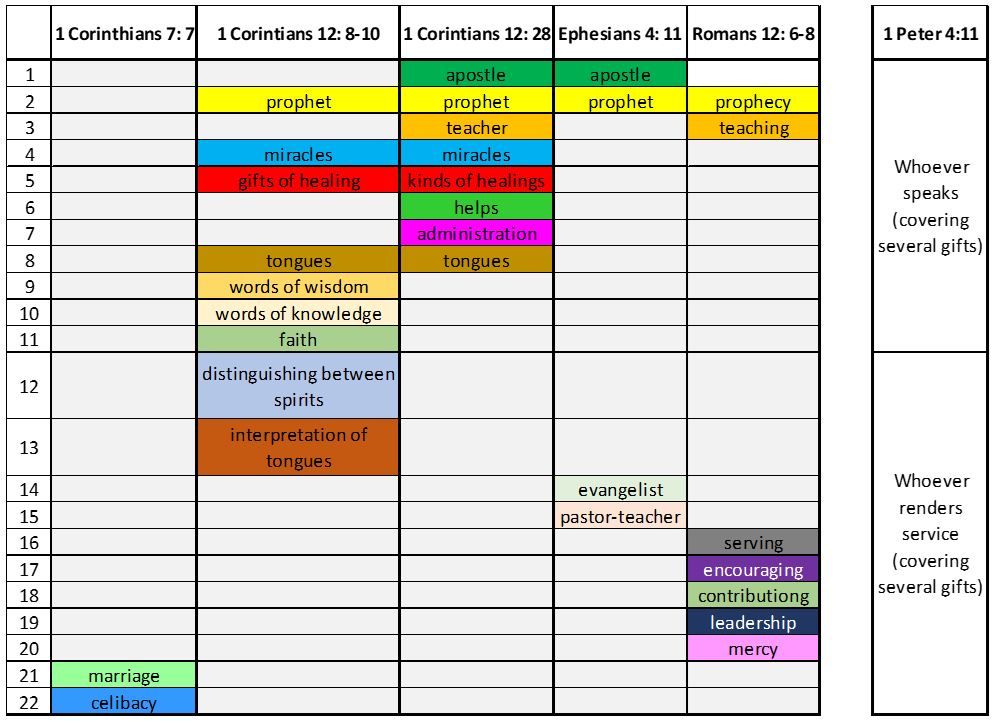Spiritual Gifts of the Holy Spirit

What do we mean by “spiritual gifts”?
A spiritual gift is any ability given and empowered by the Holy Spirit for use in any ministry of the Church. These gifts include natural abilities, such as teachings, administration, showing mercy, and gifts that are seen as miraculous such as healing, distinguishing between spirits, and prophecy.
The gifts are mentioned by Paul and Peter in six passages in the New Testament (NT), including:
- Romans 12:6-8: This passage lists various gifts of the Spirit, including prophecy, service, teaching, encouragement, giving, leadership, and acts of mercy.
- 1 Corinthians 12:4-11: This passage describes the different gifts of the Spirit as manifestations of the one Spirit, and lists several gifts including wisdom, knowledge, faith, healing, miracles, prophecy, discernment of spirits, speaking in tongues, and interpretation of tongues.
- 1 Corinthians 12:27-31: This passage emphasises the importance of the gifts of the Spirit for building up the body of Christ, and states that each member is important and has a specific role to play.
- Ephesians 4:11-13: This passage states that Christ gave some to be apostles, some to be prophets, some to be evangelists, and some to be pastors and teachers, for the equipping of the saints for the work of ministry, for the edifying of the body of Christ.
- 1 Corinthians 7:7: This passage discusses the virtues of the gifts of marriage and celibacy
- 1 Peter 4:11: This passage groups the gifts into two broad categories of speaking and service
These NT passages provide a foundation for our understanding and application of spiritual gifts from when they were written and will continue to do so until Christ returns.
Old Testament Prophecy of the pouring out of the Holy Spirit
In Joel 2:28-29 the prophet Joel foretells of the day when the Holy Spirit will be poured out on all people.
And it will be that, afterwards,
I will pour out My Spirit on all flesh;
then your sons and your daughters will prophesy,
your old men will dream dreams,
and your young men will see visions.
29 Even on the menservants and maidservants
in those days I will pour out My Spirit.
John the Baptist, the last of the old covenant prophets heightens people’s expectations of the fulfilment of Joel’s prophecy when he proclaims in Matthew 3:11
“I baptise you with water for repentance. But after me comes one who is more powerful than I, whose sandals I am not worthy to carry. He will baptise you with the Holy Spirit and fire.
What is the Purpose of these Spiritual Gifts?
The NT strongly emphasises the importance and significance of spiritual gifts. Within its pages, we’re told that these spiritual gifts are a manifestation of the Holy Spirit and are given to believers for the purpose of building up the body of Christ and spreading the gospel.
The outpouring of the Holy Spirit at Pentecost (Acts 1:8) was to equip and enable the early Church to go out into the world and preach the Gospel. In this outpouring, the Holy Spirit gave the spiritual gifts to equip the Church so that it could effectively carry out the ministry of Christ until his return. Paul writes in Ephesians 4:12 Paul that the gifts are to equip the saints for the work of ministry and for building up the body of the Church.
In 1st Cor 1:7 he tells us that we have them until Christ’s return,
7 Therefore you do not lack any spiritual gift as you eagerly wait for our Lord Jesus Christ to be revealed.
Paul connects the spiritual gifts and their position in the period between Christ’s ascension and his return in 1st Corinth 13:10 where he writes;
“when the perfect comes the imperfect will pass away”.
When Christ returns, the gifts will be superseded by something much greater
What are the gifts of the Holy Spirit?

As can be seen above there are many spiritual gifts, including prophecy, teaching, miracles, healing, tongues, and interpretation of tongues, among others. These gifts are divinely given abilities that are to be used for the common good and to serve the church.
These are seen as a sign of the presence and power of the Holy Spirit in the life of a believer. However, they are not given as a measure of spiritual maturity or as a means of personal prestige or rank, but simply as a way to serve others and glorify God, “so that none may boast”.
The NT also emphasises the importance of diversity and unity in the use of spiritual gifts. For example, 1 Corinthians 12:4-7, it states that there are different kinds of gifts, but the same Spirit distributes them. The passage tells us that the gifts are given to each person as the Spirit sees fit and are to be used for the common good of the church.
Spiritual gifts are an important manifestation of the Holy Spirit given as a means of serving and building up the body of Christ. These principles continue to inform and shape the understanding of the spiritual gifts of Christians today.
The gifts of the Holy Spirit can be grouped into different categories.
- Charismatic gifts: These gifts are related to public ministry and include: prophecy, speaking in tongues, miracles, healing, and interpretation of tongues.
- Power gifts: These gifts are related to serving and include: faith, miracles, healings, and helps.
- Practical gifts: These gifts are related to serving and include: administration, helps, service, teaching, and exhortation.
However, these groupings are not universal and vary among different Christian denominations and traditions as per each church’s needs.
In the Old Testament Scripture, spiritual gifts were seen as a manifestation of the presence and power of God among his people. The gifts of the Spirit were a means by which God empowered individuals to perform specific tasks and fulfill particular roles in the community.
Scripture mentions several spiritual gifts, including prophecy, wisdom, and the word of knowledge. For example, the prophet Isaiah was gifted with the word of the Lord, and King Solomon was known for his wisdom.
In Scripture, spiritual gifts were often associated with the worship of God and were used to build up the community and restore God's people. For example, the gift of prophecy was used to bring God's message to the people, to encourage them to turn from their sins, and to comfort them in their struggles.
Additionally, like Scripture, the NT also recognises the importance of discernment and testing of spiritual gifts to ensure that they are from God and align with his will. For instance, in Deuteronomy 18:21-22, it states that a prophet who speaks in the name of other gods must be put to death.
Spiritual gifts are a means by which God empowers and guides his people, and all Scripture emphasises the importance of testing and discernment in the use and application of these gifts. These precautionary principles remain relevant today.
Cessationism.
The theory of “Cessationism”, is a belief held by some Christians that the supernatural gifts of the Holy Spirit, such as speaking in tongues and prophecy, were only intended for the early church, and have ceased to exist in the present day. Advocates of this theory argue that these gifts were only necessary for the establishment and growth of the early church and are no longer necessary for the spread of the gospel today.
Cessationists point to 1 Corinthians 13:8-10
8 Love never fails. But where there are prophecies, they will cease;
where there are tongues, they will be stilled;
where there is knowledge, it will pass away.
9 For we know in part and we prophesy in part,
10 but when completeness comes, what is in part disappears.
These verses state that prophecy and other spiritual gifts will eventually cease when the "perfect" arrives. Cessationists interpret the "perfect" to mean the completion of the NT canon, which is considered to be the authoritative and inspired source of Christian teaching.
For example, if someone announced they were a prophet and proclaimed they had been given a new prophecy from God, then surely if true, the NT Canon would need to be revised accordingly. Over the years some people have claimed to be prophets of God and yet their message has been rejected by the Church. (it’s not hard to think of a few such people)
However, many Christians who believe in the continuation of spiritual gifts reject the theory of cessationism, arguing that these gifts are still present and active in the church today. They point to the experiences of believers and the continued manifestation of these gifts in various Christian communities as evidence of their ongoing presence and use by the Holy Spirit.
Ultimately, the question of whether spiritual gifts have ceased is a matter of interpretation and belief within the Christian community, and this debate goes extends amongst different traditions on this topic.
The Gift of Prophecy
Prophecy is the inspired “Word of God” that concerns future events that are given by God. It is considered a spiritual gift that was prevalent in Scripture and the early Christian church. Many Christians still recognise it as a manifestation of the Holy Spirit today.
Christians view prophecy as a means by which God communicates his will, guidance, and direction to humanity. Prophecy can take many forms, including preaching, teaching, and written revelation. The purpose of prophecy is to edify, exhort, and comfort believers, as well as to provide direction and guidance for the church.
According to the NT, prophecy is not limited to predicting future events, but can also include revealing the truth of God's word, exposing sin, correcting false teachings, and encouraging righteous living. In addition, the NT emphasises the importance of testing prophetic messages to determine their authenticity and to ensure that they align with the teachings of the apostles and the word of God.
None of the spiritual gifts are for personal gain or glory but as a means of serving and building up the body of Christ. The American theologian John Piper, when discussing the subject of modern-day prophecy, retells of a lady coming to him saying that God had given her a prophecy that his wife would die in childbirth, and that she would give birth to a daughter. As you can imagine this caused him severe emotional distress. Thankfully his wife had a normal pregnancy giving birth to a baby boy. The lady’s prophecy was false, and it begs the question, how could a message like this ever build up or encourage anyone? The dangers of false prophets cannot be understated.
Any “Prophetic” messages must be tested and evaluated in line with the teachings of the Bible and the guidance of the Holy Spirit.
For me, the gifts of Words of wisdom and knowledge do occur, but not prophetic in that so much that they're not revelations of future events but simply serve to encourage and bolster others. As for the existence of modern-day prophets, I sit with the Cessationists on this one, the Canon is closed.
(No doubt the debates about the nature and role of prophecy will continue for years to come.)
Have a great day, and as always, God bless,
Trev.